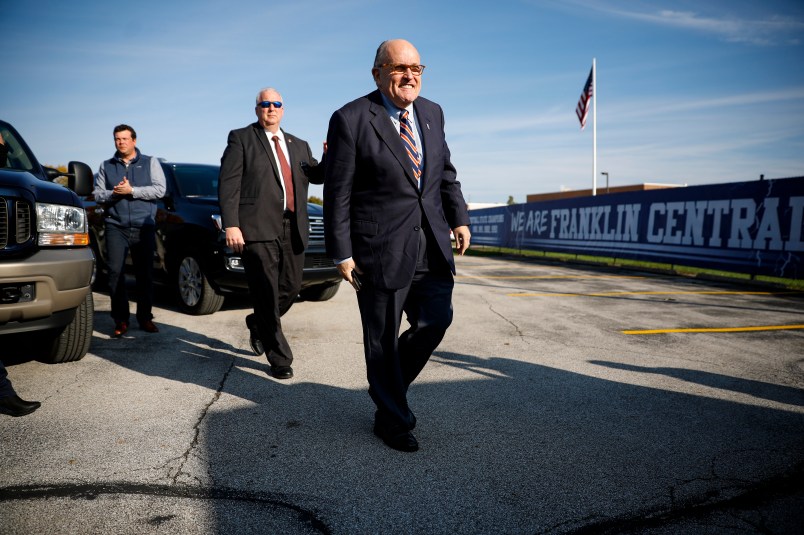As President Trump and his attorney Rudy Giuliani mounted a pressure campaign on Ukraine to manufacture dirt on Democratic frontrunner Joe Biden, they may have received help along the way.
But it’s not an outside fixer, but rather the U.S. State Department. Accounts differ, but the agency appears to have played a crucial role in connecting Giuliani with an aide of Ukrainian President Volodymyr Zelensky.
For his part, Giuliani has given the State Department a bear hug, claiming variously that the agency instructed him to go on a “mission” for the U.S. and that it had set up his meeting with the Zelensky aide. The Washington Post reported that U.S. diplomats stationed in Kyiv “expressed concerns” about the meetings, in part because it was unclear if Giuliani was speaking as a private citizen or as a representative of the State Department.
The State Department’s apparent involvement in the scandal focuses on Kurt Volker, a former U.S. ambassador to NATO who was appointed special representative for Ukraine by then-Secretary of State Rex Tillerson in July 2017.
Giuliani met with top Zelensky foreign policy aide Andriy Yermak on Aug. 3 in a meeting that was facilitated by Volker. Giuliani reportedly debriefed State Department officials afterwards.
The question is, how deep did State get in Giuliani’s game?
The answer to that question is, in part, the focus of an inquiry by the House Intelligence, Oversight, and Foreign Affairs Committee’s into Giuliani’s pressure campaign to extract dirt on Biden. It goes to the heart of what makes these allegations against President Trump different and what, in the words of one former Defense Department official, has broken new ground in U.S. political history: the use of the power of U.S. foreign policy to beat down a political opponent.
Anders Aslund, a senior fellow at the Atlantic Council and longtime Ukraine-watcher, told TPM that “the request came from Ukraine because they understood that the person they needed to speak with was” Giuliani.
“Of course, it’s completely inappropriate,” Aslund said. “This was extortion.”
The State Department issued a statement on the matter Sept. 9, saying that Giuliani “does not speak on behalf of the U.S. Government.”
“We would refer you to Mr. Giuliani for information about the content of Mr. Giuliani’s conversations with Ukrainian officials,” the statement read.
In one telling, offered by Yermak himself, he approached Volker for an introduction to Giuliani as part of a bid to “clarify” Zelensky’s position after the former New York City mayor criticized him in May.
Giuliani had cancelled a planned mission to Kyiv in which he intended to dig up dirt on Biden and find information that would exonerate Paul Manafort, the Trump campaign chairman whose financial misdeeds eventually landed him in prison.
At the time of the cancellation, Giuliani pinned his decision on the fact that Zelensky was “in hands of avowed enemies of Pres Trump. Useless meeting,” reported Politico, citing a text from the former mayor.
But in a Monday Russian-language interview with the Ukrainian press, Yermak said that Giuliani’s statement about “enemies” in Zelensky’s team led him to reach out.
“I was acquainted with Kurt Volker at that time, and so I told him about my idea to speak with Giuliani, in order to clarify the situation,” Yermak said. “He approved of the idea, and offered to introduce me.”
Yermak added that “Giuliani and I spoke over the phone, and after this met personally in Madrid.”
“[Giuliani] remarked, that for him it was important to hear that the new Ukrainian authorities would adhere to principles of openness and lawfulness, that we would fight corruption, and place a goal for ourselves of making Ukraine successful,” Yermak added.
This is the Madrid meeting on Aug. 3 where Giuliani reportedly pushed for Kyiv to open investigations into debunked allegations that Biden helped quash a criminal investigation into his son.
Steven Pifer, a former U.S. ambassador to Ukraine, told TPM that Giuliani’s direct access to Trump would make him valuable.
“I understand if you get that request, given Giuliani’s position, it’s pretty hard to say no,” he said. “But what Giuliani is doing, I think, conflicts with what we’re trying to do with Ukraine, he’s party to something to accomplish the President’s re-election” – not the State Department’s mission.
“It sends conflicting messages to the Ukrainians,” he added.






